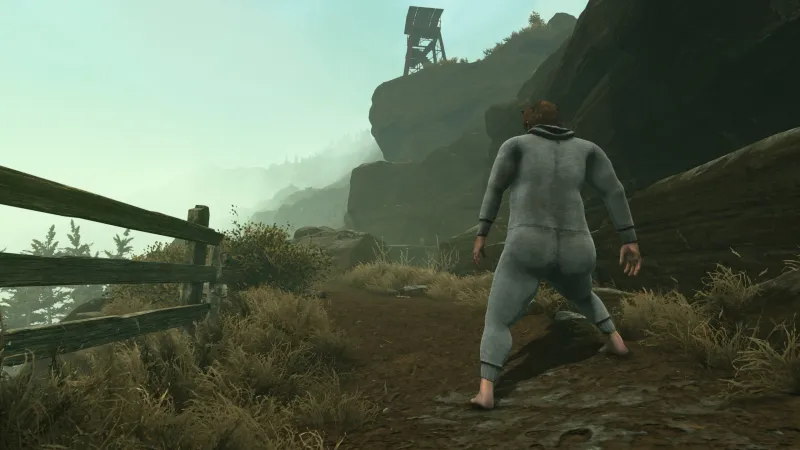

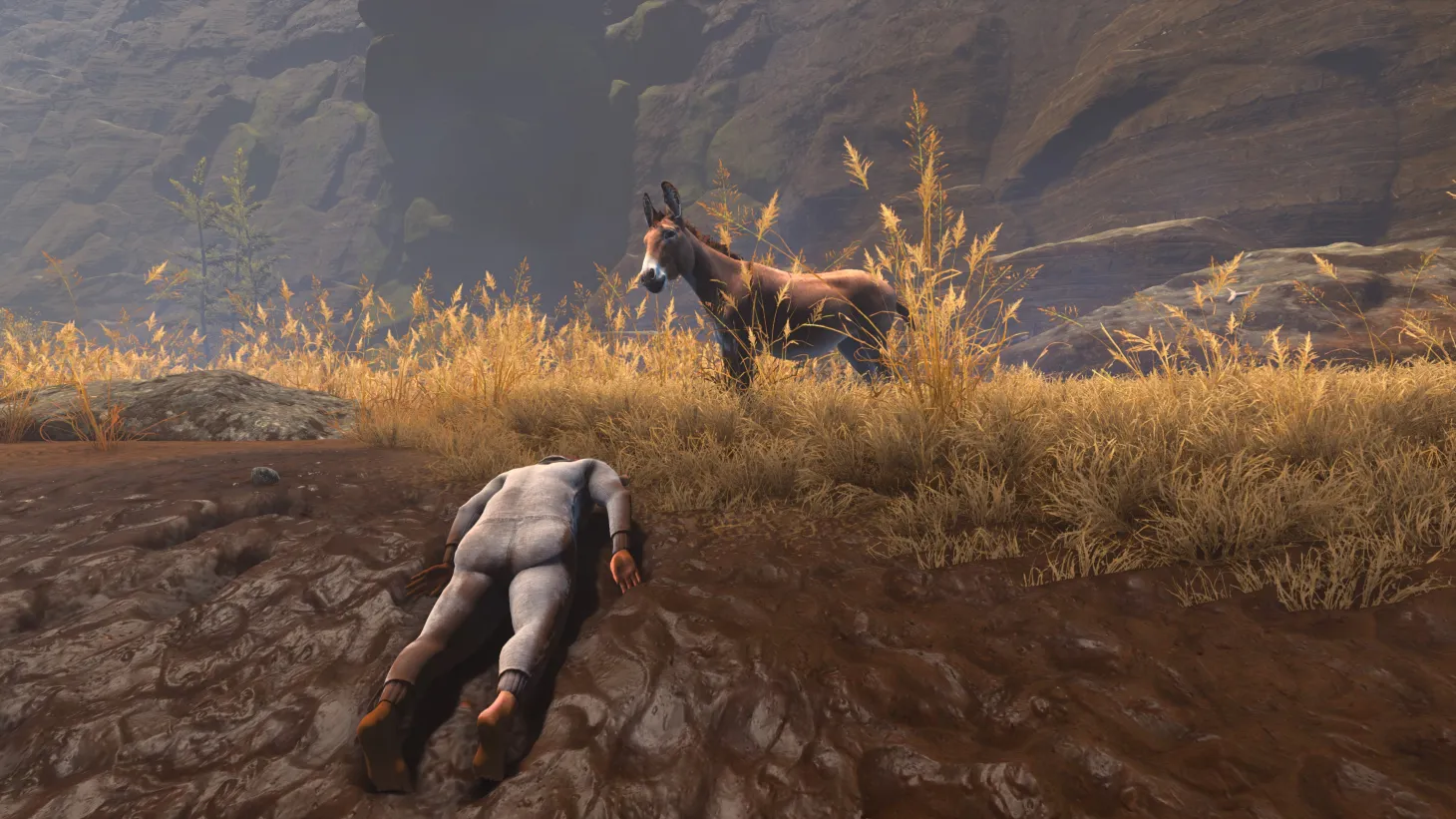
I spent the majority of my time reviewing Baby Steps in various states of anger, ranging from mild annoyance to controller-throwing rage, but when it intends to make me feel this way, it’s hard to deny that Baby Steps is effective. “Ragebait” games like this one are supposed to elicit that response. I appreciate how Baby Steps commits to the bit by making the player the brunt of the joke, along with its surreal story. Still, its frustrating difficulty, paired with occasionally poorly designed levels, kept me from laughing alongside it.

In the opening cutscene, Nate, a pathetic man who lives in his parents’ basement, is transported to a mysterious mountain. Through a series of awkward conversations, he learns he’ll have to reach the summit to make a wish to go home. However, Nate is also so socially awkward that, hilariously, he refuses almost every offer of help so as not to bother his fellow climbers. He turns down shoes, climbing equipment, and a map (complete with a minimap and compass in the corner), none of which you ever get, making the game laughably more difficult.
The cherry on top, and the game’s premise, is that players control Nate one leg at a time, stumbling through the whole journey and often falling down. The controls are intentionally clumsy, with the left and right triggers lifting their respective legs. While it initially feels impossible, it’s oddly satisfying to walk once you get the rhythm down. Of course, challenges quickly escalate from slight, hilly inclines to intricate balancing acts, ratcheting up the difficulty. To make things worse, getting off balance, which happens constantly, immediately locks Nate into a ragdoll state, causing him to fall until he reaches a stable position. The hardest climbs of Baby Steps aren’t just frustrating because of their difficulty, but because you have to do them again and again until you prevail onto the next section.
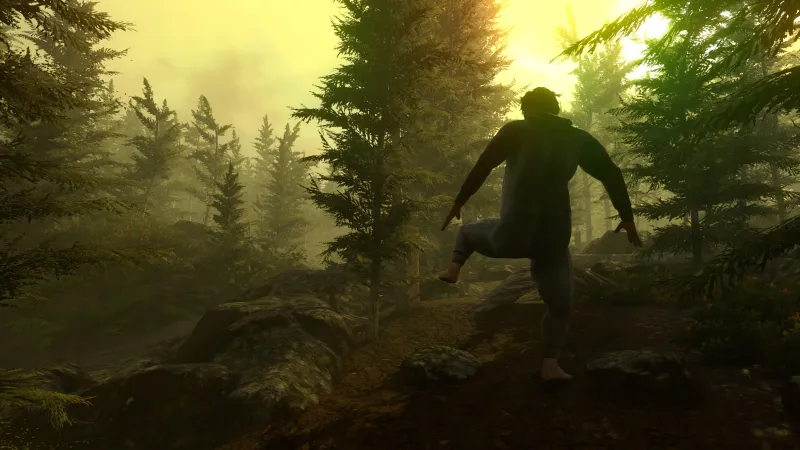
Bennett Foddy’s past work (he's best known for Getting Over It and QWOP) is characterized by a steep difficulty curve, and Baby Steps is no exception, though it was more approachable than I expected. The key to this, especially in earlier areas, is how the semi-open world is peppered with optional challenges. If you want a tougher experience, simply turn at the next fork in the road, and you’ll find a difficult path or structure to explore, but if you stick to the main path, the walk will remain manageable. Optional challenges reward collectible hats and fruit that unlock new story content, granting devoted players an incentive to take on tougher challenges.
Where Baby Steps really stumbles is in its later levels, where the paths forward are poorly telegraphed. Moving Nate anywhere other than where he needs to go is a risk because at any given moment, you could (and probably will) make a wrong step and fall to an earlier area. It’s maddening, then, to be stuck in an area with no idea where to go, and no idea if the arduous climb you’re attempting is even required. On several occasions, I made my way into a later area by doing a climb I felt I wasn’t supposed to be doing. It wasn’t hard in a way that seemed intended, but rather like I was clinging to random bits of geometry and eventually prevailing. For every unclear path that did lead to a way forward, I tried and failed to progress through three more; the only indication I was in the right area was that I eventually moved forward. It’s hard to commit to tough challenges when it’s not clear whether it’s designed for me to attempt.
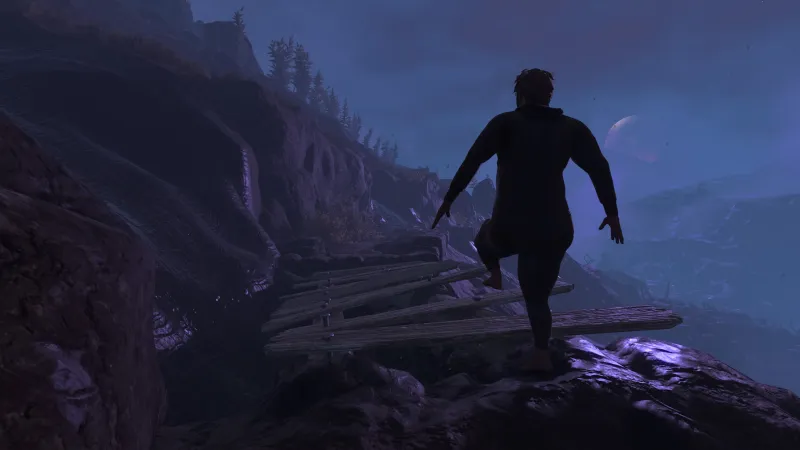
These failed attempts, however, are undeniably silly. Baby Steps is funny, but instead of inviting players in on the joke, the players become the joke. To play Baby Steps is to be pranked left and right, to be forced into unreasonably difficult situations armed only with your sweaty onesie and two bare feet. This is a game designed for streamers, which is to say that it’s more fun to watch than it is to experience yourself: When someone else is the subject of Baby Steps’ pranks, it’s far more tolerable. Hours into the game, I’d become desensitized to the absurdity of it all, but whenever my partner saw Nate flopping around on the screen, she laughed aloud. Failure, though it’s frustrating as a player, is funny, and Baby Steps capitalizes on that.
The other aesthetics, from visuals to music, are surreal and bizarre. Nate is constantly encountering anthropomorphic horse men who are nude from the waist down, a fact no one acknowledges. Bringing a hat back to camp triggers a Game Boy-style dream sequence about Nate’s past. At one point, I woke up to see a giant woman lift me off my feet, cradle me like a baby, set me down on a high ledge, and leave. The music, meanwhile, is an experimental rhythm of sound effects, playing various clicks, scrapes, splashes, and animal noises in repetitive sequence. It adds to the world’s odd vibe, but I mostly found these tracks annoying and grating, and would have preferred something just a touch more melodic or approachable.
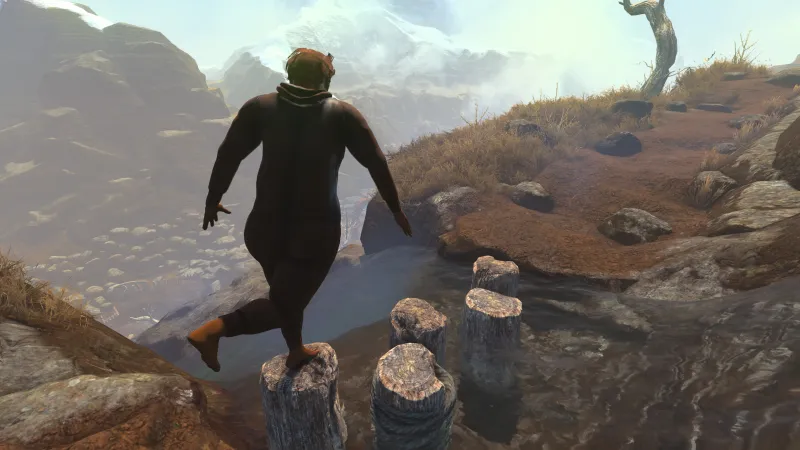
My feelings about the music extend to the whole of Baby Steps, I suppose. I see what they are going for. I understand why and how it’s funny. And I appreciate how unique it is, but I would be lying if I said I enjoyed it. It’s a truly singular experience, something we will always need more of in games. Some will enjoy struggling to climb sandy dunes and laughing at their friends falling down the same cliffside for the hundredth time, but no amount of creative appreciation will change how I felt playing Baby Steps. Every time I put the controller down, I dreaded picking it back up.

Explore your favorite games in premium print format, delivered to your door.